
What To Do Before Your Wallet
Is Lost Or Stolen
After your wallet is stolen or lost is not the time to realize you don't have the information you need to deal with the aftermath. So here's what to do now, beforehand.
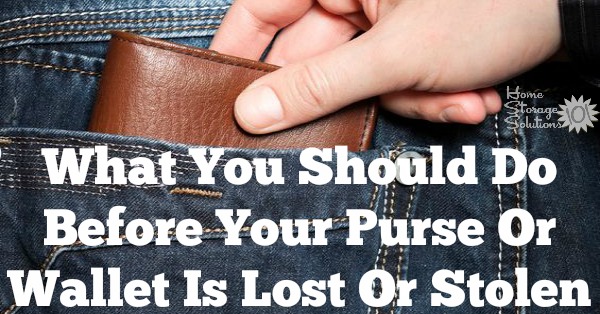
Today's Declutter 365 mission is to create an "in case wallet lost or stolen" information sheet, also known as a wallet inventory.
It's one of the discrete tasks I've listed in the Organize Contact Information Challenge here on the site as well.
Based on some of the feedback I've gotten on this mission in the past I thought it was high time to give my rationale for this quick mission, plus a bit more guidance on what you should place on this information sheet.
Quick Test: Do You Know What's In Your Wallet Right Now? {No Peeking!}
If you're anything like me, yes, you can name some things in your wallet, but it isn't as easy to rattle it all off as you might imagine.
This is especially true for items that you don't look at or reference frequently.
In addition, many of your credit cards or debit cards have information on the card about what to do if the card is lost or stolen, such as a number to call. Ummm, not very helpful place for reference after the card is lost or stolen! And I sure know I don't have those numbers memorized!
Since Time Is Of The Essence In A Stressful Situation You Should Prepare Ahead Of Time
So we've now established that you probably don't know all the stuff in your wallet, at least not without thinking good and hard, and even then you might miss a couple things.
But if this stuff goes missing you don't have time to just sit there and ponder at a leisurely pace.
Instead, acting quickly and not forgetting very important items that were in your wallet is extremely important.
To lessen the financial and other damage caused by a lost or stolen wallet time is of the essence. Thieves use credit cards almost immediately upon theft, and you want to close/freeze those accounts, etc. as soon as possible.
Plus, we don't think as well under stress, or at least I don't. And these items going missing can be quite stressful.
So the answer is to prepare ahead of time, so that if this event occurs (and we all wish it wouldn't, but statistically it is likely to occur at some point in your life), you are ready for it!
Not convinced yet you should do this? I got this comment from a reader who did do this mission. Stephanie said:
Just a quick note to let you know how one of these missions helped me. Last night my car was broken into at the gym and my purse was stolen. Back in March I had completed one of the challenges which was to make an inventory of the contents of my wallet and numbers to call to report lost/stolen cards. It was such a help to have the contents written down so I know what I need to replace. I remembered to call my health insurance provider to get my ID card replaced, AAA to get a new card, etc. Very grateful for your mission to help others get organized. Thank you!!
How To Make A Wallet Inventory
The simplest thing you can do, before your wallet is lost or stolen, is to make a quick wallet inventory.
Making one is easy. You just make a list of what is in your wallet, and include phone numbers or other contact information that the cards state on them so that if those contents are lost or stolen you can cancel/freeze them, and/or get replacements.
The beauty of such a list is that if you ever need to begin contacting people you've already done your thinking while you had a level head. And it is so much easier to just prioritize and then work down your list from most important to least important then to spin your wheels in panic, not knowing what you should do.
Types Of Information To Include In Your Wallet Inventory
Here's ideas of the types of information to add to this inventory:
- Name of debit and credit cards, plus 800 number to contact in case of loss. (You need to consider whether you'll keep the credit card number on this list as well as the name of the card and contact info. It can come in handy in case of loss or theft, but if the list itself is lost or stolen it can come back to bite you, so just consider what you want to do, considering where you'll keep it.)
- ATM cards
- Driver's license or other forms of government ID
- Checkbooks and bank deposit slips
- Health insurance (or other insurance) cards
- Frequent flier programs
- Library card
- Gift and loyalty cards
- Membership cards, such as for gym, warehouse type stores, etc.
Quick Hack If You Don't Want To Write It Out
If the thought of filling out this inventory keeps you from doing it another quick way to do something similar is to use a photocopier and lay your various cards face down and make a photocopy of them. Then, flip the cards over and do it again.
With this method you'll have a copy of what exactly is on all your cards, front and back, that are in your wallet. You can reference these photocopies as well. Just make sure you make some notes on the copies so you can readily match the right front with the right back so you don't get confused.
Where To Store Your Wallet Inventory
So where should you keep this wallet inventory? That's up to you.
You might want to keep it in a file folder, or in your household notebook, or if you want it to be electronic put it into Dropbox or Evernote for example (but make sure it doesn't have the credit card numbers on it then!).
Wherever you put it though obviously don't keep the list in your wallet!
Don't Forget To Periodically Update Your Inventory
The contents of your wallet will change with time and circumstances, so don't forget to periodically update your list or inventory.
This is an annual Declutter 365 missions so if you choose to do this, and to follow along with the missions calendar, I'll remind you next year to check your inventory again though! :)
Extra Step: Try To Winnow Down What You Carry Around In Your Wallet
An additional step you can take is to winnow down the amount of stuff you carry around habitually in your wallet.
We'll focus on this more in the Organizing Purses & Wallets Challenge as well, but it will help with this issue as well.
That's because the less stuff you carry in there the easier it is to find and access the stuff you have left which makes your life easier day in and out.
But in addition it will also shorten the list of things to do, people to contact, etc. in case of theft or loss of your wallet, which is a good thing as well.
You can check out the Declutter Your Wallet Mission for more information and guidance, including my list of items you should NOT keep in your wallet.
Want To Do More Decluttering Missions? Get Started With Declutter 365 Today!
Once you declutter one type of item in your home I bet you'll want to declutter some more. After all, decluttering gives you a great reward for even a small investment of time and energy.
The Declutter 365 system is designed to help you declutter, over the course of a year, your entire house, with just 15 minutes of decluttering each day!
Hundreds of thousands of people use this proven system to get rid of their clutter, and bring peace and calm back to their homes.
Declutter 365 works to guide you to clear the clutter without overwhelm, focusing on just one small area at a time, and without making a huge mess in the process, so you see consistent forward progress without all that "messy middle" that makes it even harder to function in your home than before you started.
In addition to building a daily decluttering habit, the Declutter 365 program, along with the accompanying 52 Week Organized Home Challenge, teaches you the skills, habits, routines, and mindsets necessary to maintain the clutter free and organized state of your home from now on, so it'll never be as messy and cluttered as it is right now, ever again.
If you haven't already, make sure to get your copy of this year's Declutter 365 annual calendar here (it's FREE!), find today's date, and do 15 minutes of decluttering on the day's mission. Then, repeat again tomorrow, and again and again. Over the course of the next year, if you do this 15 minutes per day, you'll declutter your whole house!

Get This Bills & Financial Decluttering Checklist + 32 Other Decluttering Checklists For Your Home
Right now you're decluttering papers and other items dealing with your bills and financials, and there's a lot of these types of items around your home.
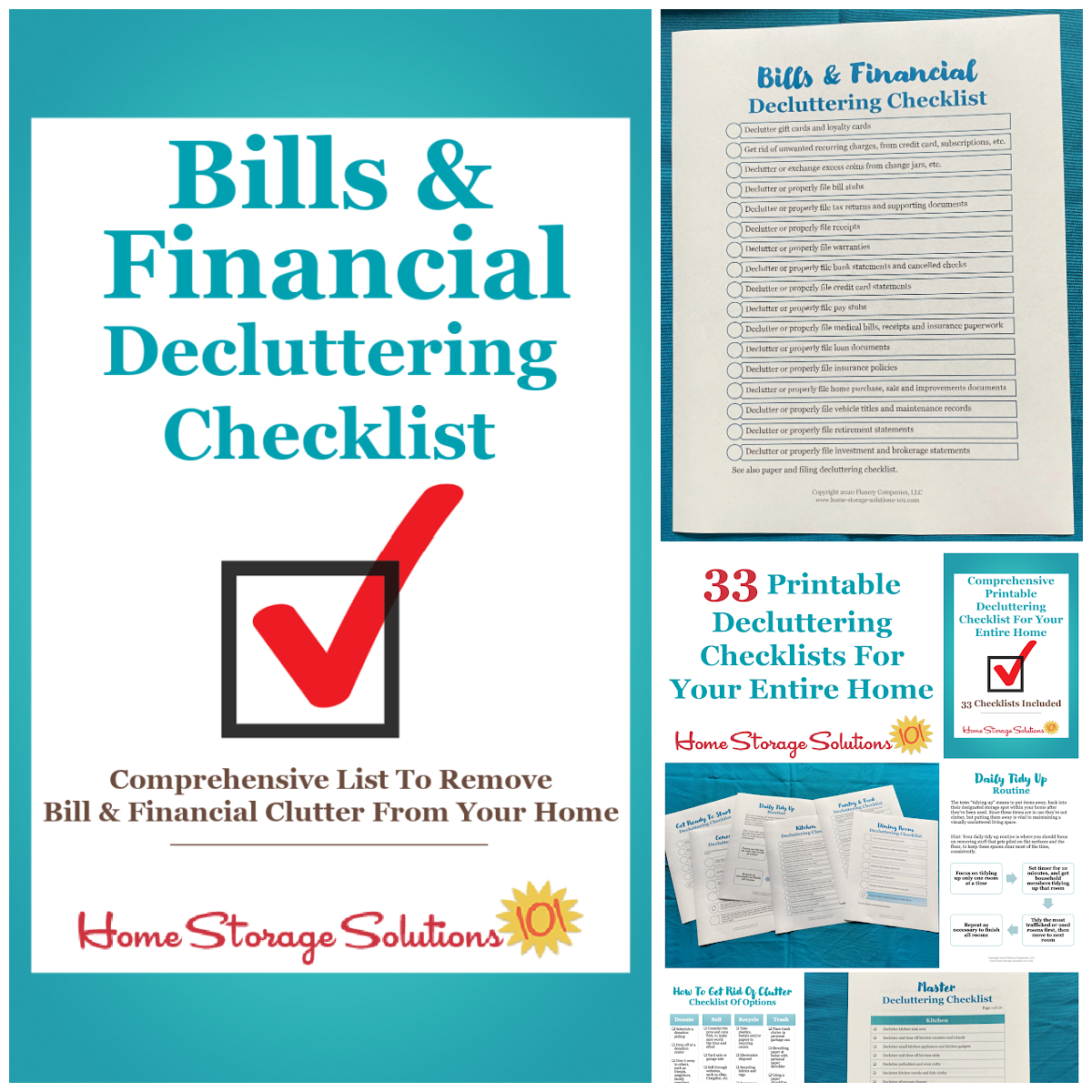
I've done the hard work of breaking down these tasks into smaller more manageable steps for you, so you don't get overwhelmed or worry you're forgetting a task, and you can go at the pace you want, whether that's fast or slow.
In addition, you can tackle these decluttering tasks in whatever order you want when you use these checklists!

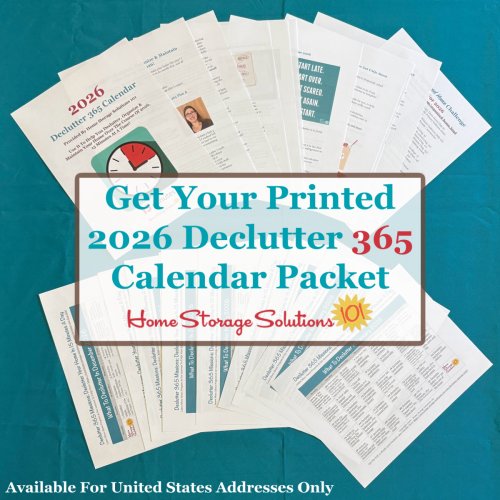
Related Pages You May Enjoy
Join The 52 Week Organized Home Challenge
Go From What To Do Before Your Wallet Is Lost Or Stolen To Home Page
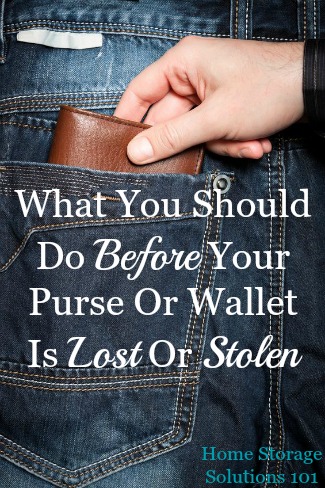

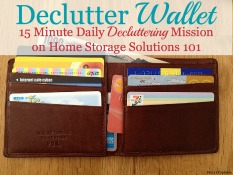
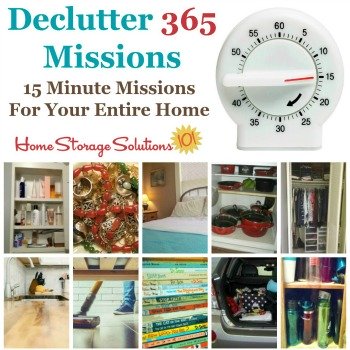
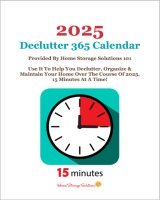
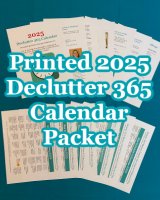




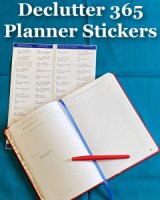







Share Your Comments, Tips & Ideas
I would love to hear from you, sharing your thoughts, questions, or ideas about this topic, so leave me a comment below. I try to always respond back!